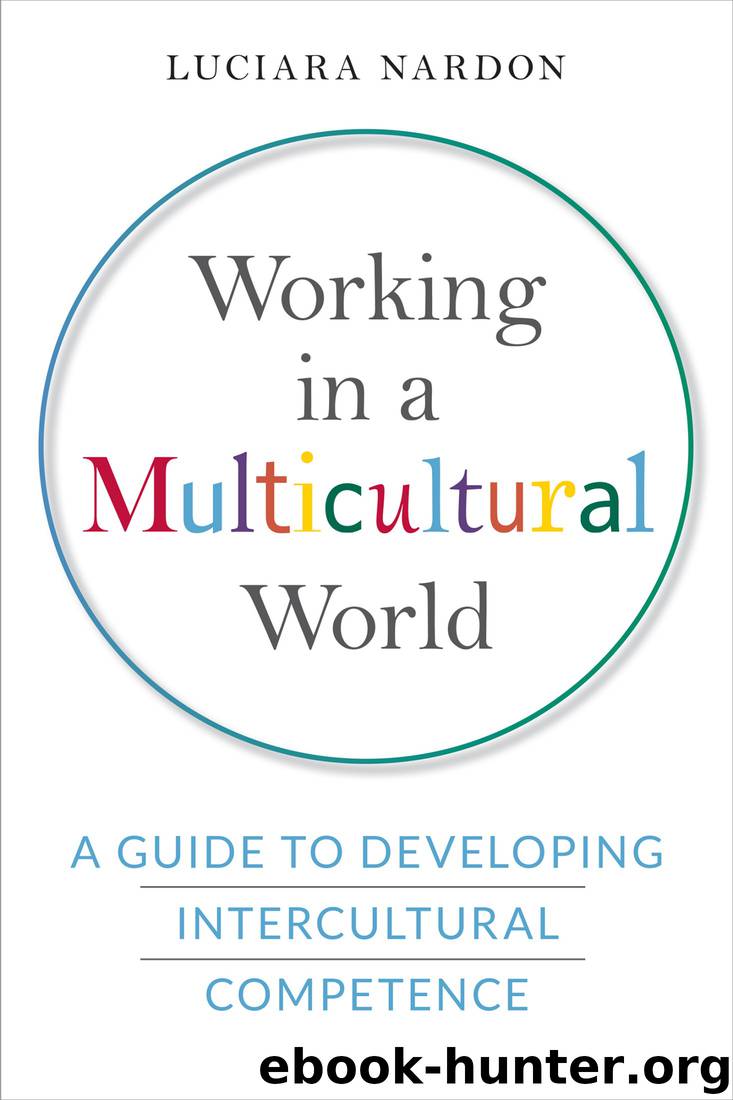Working in a Multicultural World: A Guide to Developing Intercultural Competence by Luciara Nardon

Author:Luciara Nardon
Language: eng
Format: epub
Tags: Business & Economics, Business Communication, General, international, Self-Help, Communication & Social Skills
Publisher: Rotman-UTP Publishing
Published: 2017-01-01T00:43:56.009000+00:00
Role Expectations
We engage in multiple roles throughout our lives. On a given day we may enact the role of parent, child, friend, spouse, peer, customer, manager, teacher, community member, and so on. Depending on the roles we are enacting, we may think and behave differently. For instance, we will interact differently with our children than with our work colleagues. A police officer will interact with others differently in her role as a police officer than she does in her role as a member of the community.
Understanding the role that an individual is playing in an interaction is critical. Our location within the hierarchy and our assigned roles and responsibilities influence what is important to us, how we interpret facts and situations, and, as a result, how we behave. In fulfilling our roles, we become engaged in specific activities, procedures, and communications that determine which aspects of a situation become important to us. For example, a marketing manager may be most concerned with increasing the organization’s visibility and reputation, while the finance manager may be most concerned with the cost of the initiative and the implications for the organization’s bottom line.
Specific roles and positions in a social group also carry certain normative expectations.6 These roles help shape people’s interpretations of our approach to work and other people. For example, while we may expect to see the kitchen staff serving food or clearing tables in the company cafeteria, the same behavior by the CEO would likely catch our attention; it is “out of context.” Normative expectations about roles may vary across cultures. For example, to what extent is it acceptable for a boss to go out drinking with the junior staff? Or to provide personal advice? Situational awareness implies not only an awareness of what my role is (e.g., a manager or teacher) but also an understanding of the expectations of others regarding what this role entails.
Because of these normative expectations, our role in an intercultural interaction guides what others expect from us and how they behave toward us. For instance, sometimes we go abroad with a specific purpose where our “foreignness” is our main asset, such as in situations where we are called in to train local personnel on a specific skill or process that is associated with our home culture. For example, consider Jack’s situation.7 Jack is an Anglo-American expatriate working for a U.S. company with South Korean business ties. Jack had a degree in East Asian studies, was fluent in Korean, and was passionate about Korean culture. When his employer needed an executive assistant to be located in Seoul to help manage the day-to-day administration of its joint venture and represent the American partner, he seemed like the perfect choice. He was easily able to mix with the local population and quickly embraced many of the characteristics of a typical Korean executive, including listening to subordinates’ personal problems and keeping close ties with many of the men in the organization. However, his Anglo-American superior did not appreciate his adaptation
Download
This site does not store any files on its server. We only index and link to content provided by other sites. Please contact the content providers to delete copyright contents if any and email us, we'll remove relevant links or contents immediately.
Hit Refresh by Satya Nadella(9136)
The Compound Effect by Darren Hardy(8968)
Change Your Questions, Change Your Life by Marilee Adams(7783)
Nudge - Improving Decisions about Health, Wealth, and Happiness by Thaler Sunstein(7707)
The Black Swan by Nassim Nicholas Taleb(7129)
Deep Work by Cal Newport(7085)
Rich Dad Poor Dad by Robert T. Kiyosaki(6633)
Daring Greatly by Brene Brown(6514)
Principles: Life and Work by Ray Dalio(6449)
Playing to Win_ How Strategy Really Works by A.G. Lafley & Roger L. Martin(6308)
Man-made Catastrophes and Risk Information Concealment by Dmitry Chernov & Didier Sornette(6019)
Big Magic: Creative Living Beyond Fear by Elizabeth Gilbert(5773)
Digital Minimalism by Cal Newport;(5765)
The Myth of the Strong Leader by Archie Brown(5508)
The Slight Edge by Jeff Olson(5418)
Discipline Equals Freedom by Jocko Willink(5390)
The Motivation Myth by Jeff Haden(5212)
The Laws of Human Nature by Robert Greene(5208)
Stone's Rules by Roger Stone(5088)
